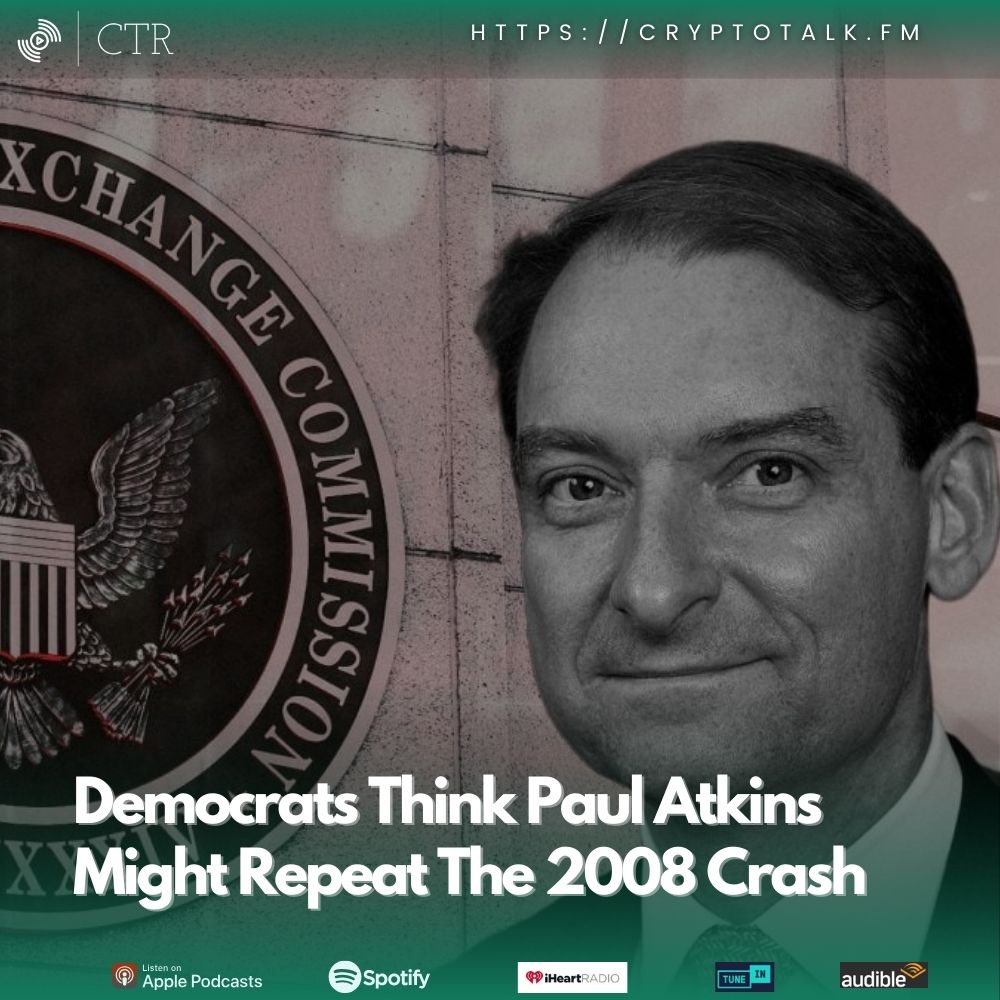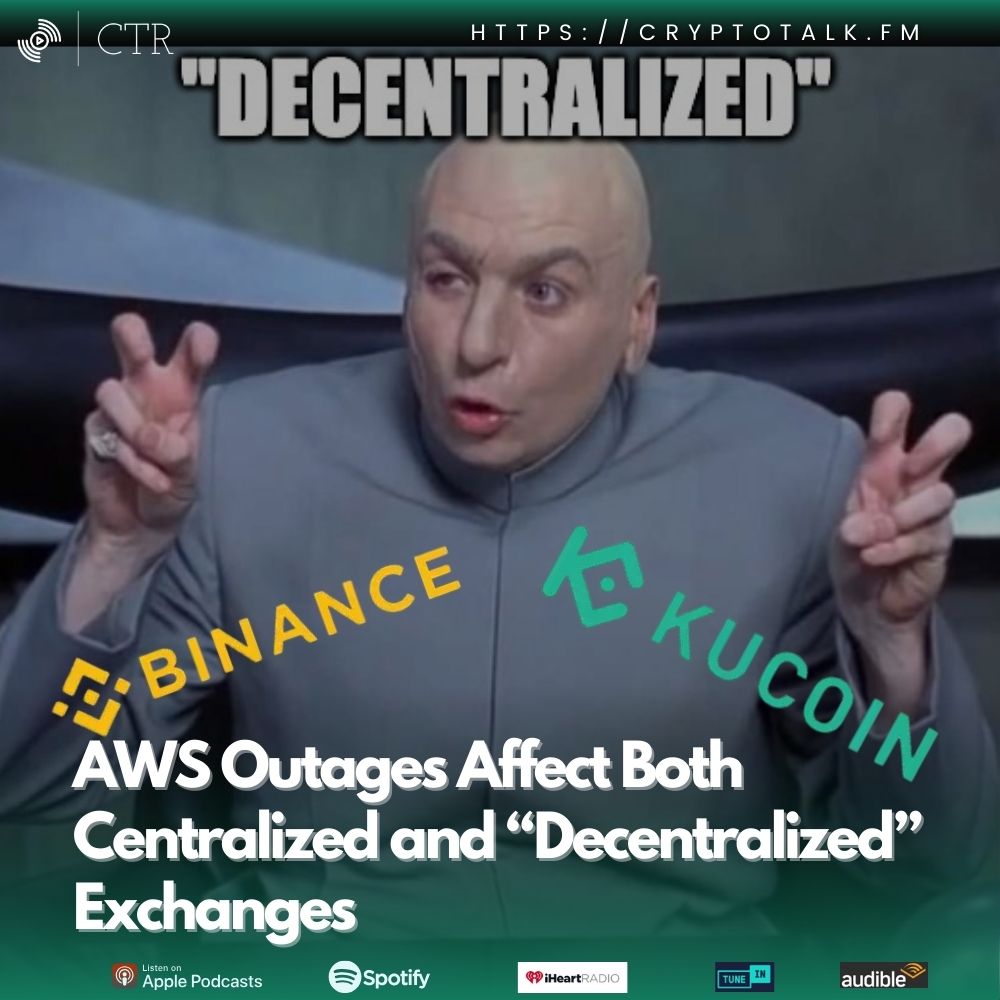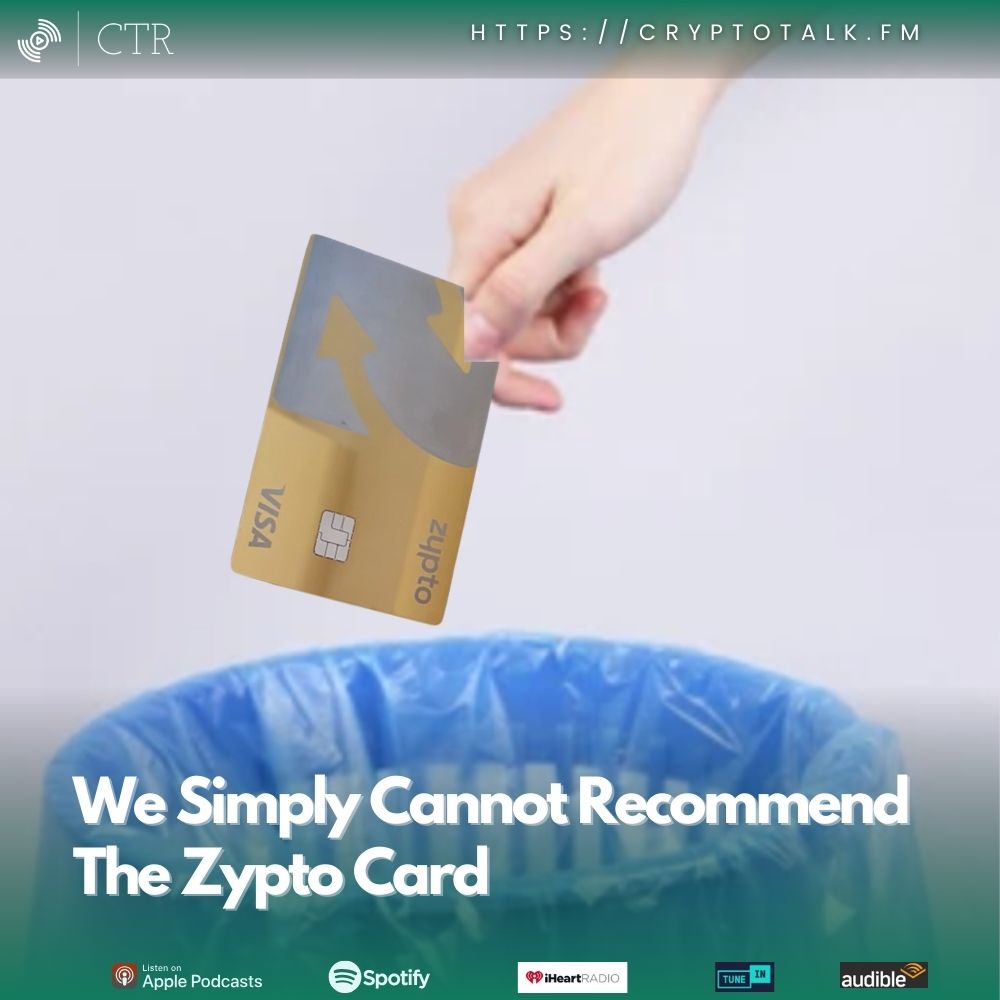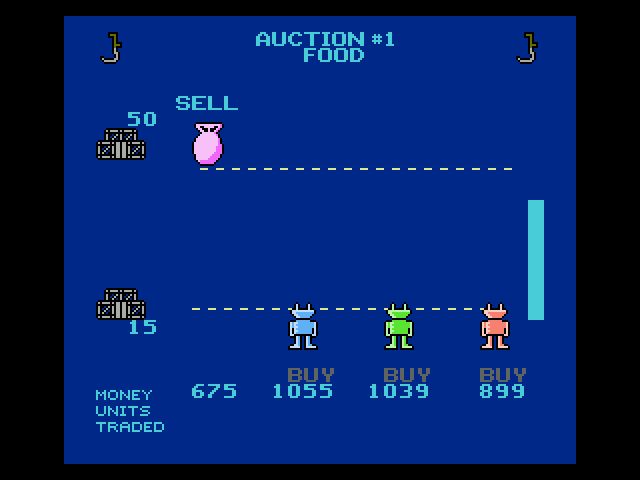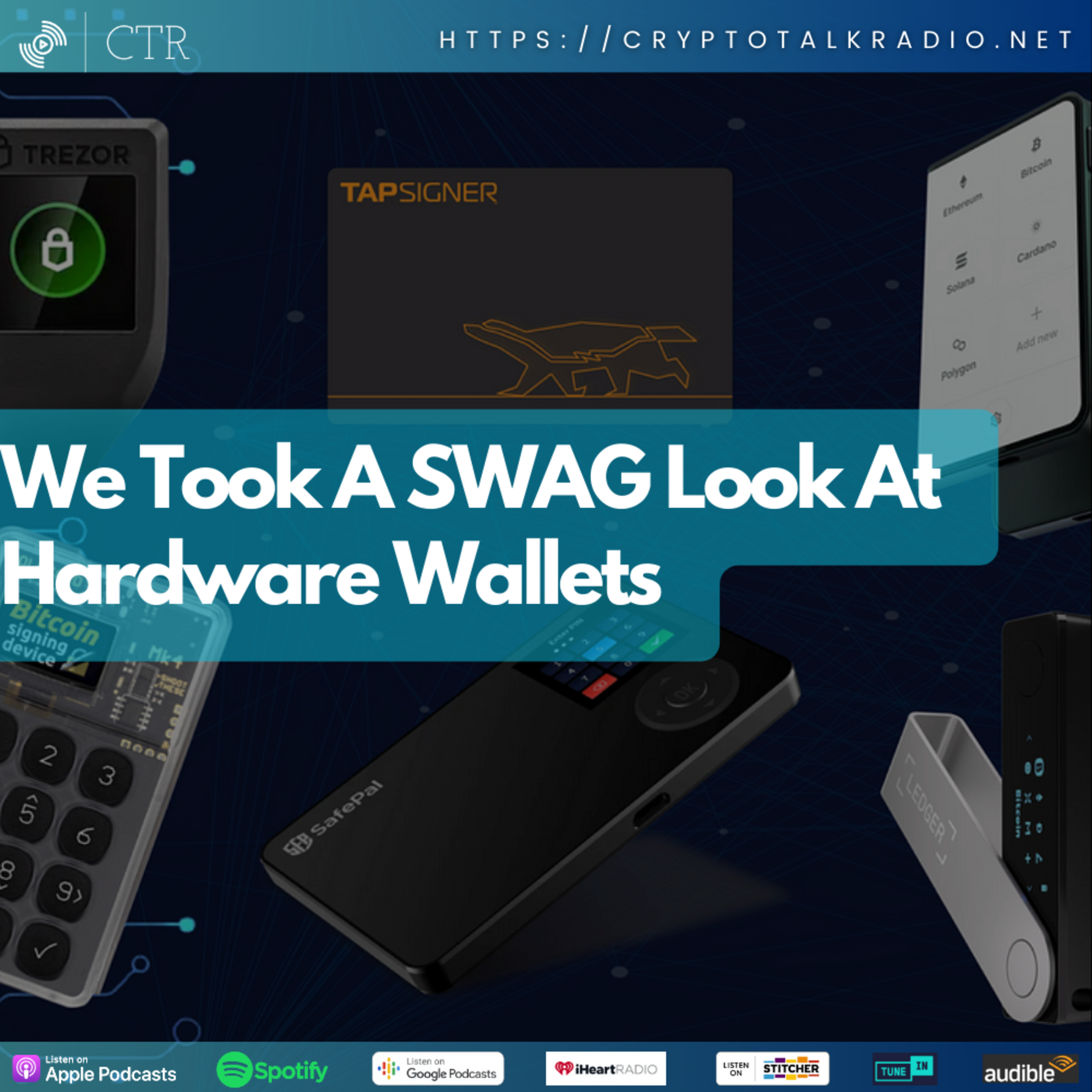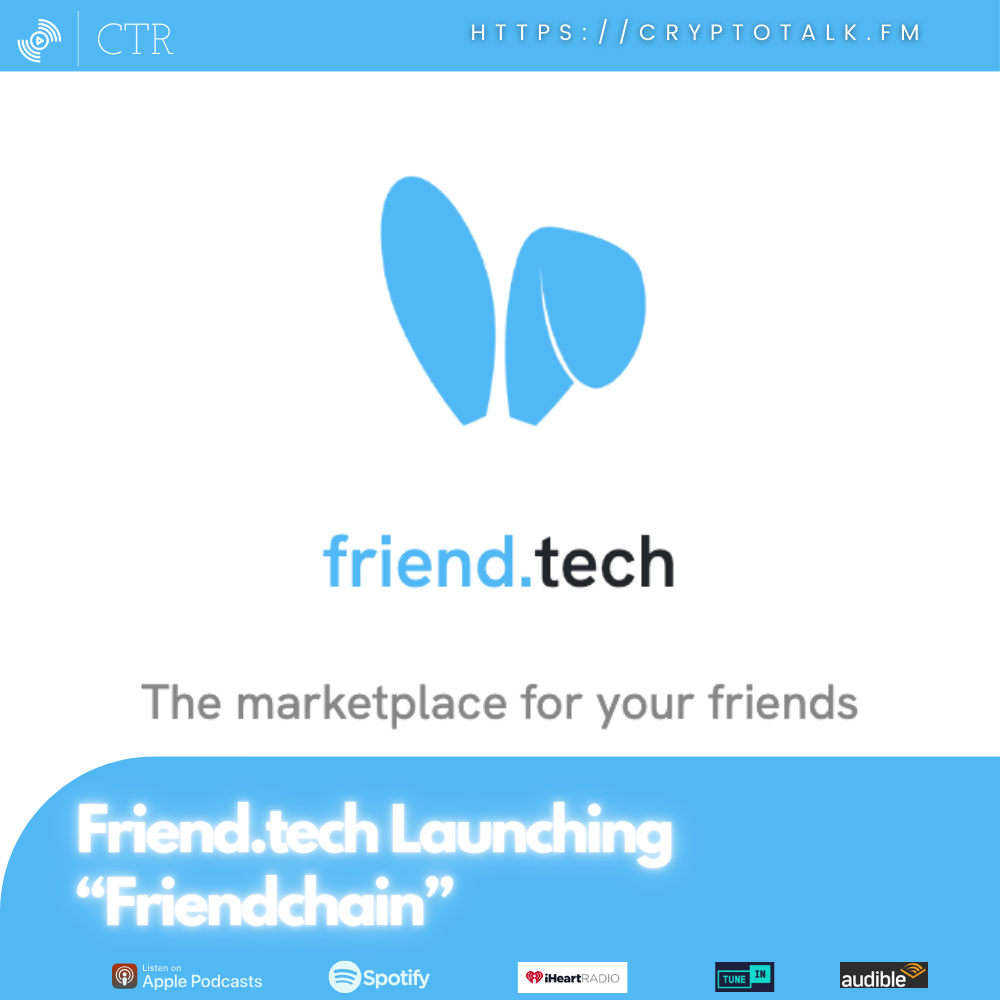[00:00:01] Welcome to Crypto Talk Radio, the podcast for everyday investors like you. Visit us on the
[email protected] and now here's your host, Leister. Thank you for that, Bailey. And welcome everybody out there on Crypto Talk radio
[email protected] physically I am not feeling good at all with respect to cryptocurrency. It's a different, slightly different story because Ethereum started going on a run as I record this. I'll be talking about that in today's episode amongst all the other subject matter pieces that I've got to go through. I do not have a basic Cryptonomics today, and today will be a reasonably short episode, but I have a couple of tidbits I want to talk about. Let me give a quick personal update simply because I think there's. I haven't done in a while and I think there's value in doing so. And if you're a gamer, I don't know if there's any game I'm assuming so most crypto folks are gamers that are on the younger end of the spectrum. If you're a gamer, there's a couple of games that came out very recently. One of them is the remaster for Lunar, which comes from the old Sega CD era. The remaster is censored on the script level and there's no logical reason for the censorship that I can see. So I'm going to recommend that you do not play that version of Lunar. It is not true to what it needed to be. It's hard to get the PS1 versions. Yes, they're very expensive. I would not recommend you yar your way into it, but if you are a fan of it and you want to just do it anyway, then it is out. But you're gonna have a hard time getting it physical because Amazon screwed the pooch on that. The other one was Xenoblade Chronicles X on the Switch and I was playing that one. I. I think it's garbage, but I wanted to, you know, I've already beat the other ones in the series, so. So I just wanted to round it out. The Wii U is a garbage console, so this is an opportunity to play it on an actual console with good controls and I don't regret playing through it just so I could be objective. But I already knew from when I tried it on the Wii that it was like garbage. It's like terrible, terrible story, lacking story, terrible character development, just not good.
[00:02:12] But I will say for all the terrible that it is in terms of exploration, it's probably the most flexible of all the ones in the series. It's just a wide open world.
[00:02:28] Xenoblade 3 is a segmented world. Xenoblade 2 is a segmented world. Xenoblade 1 is a segmented world. They're all segmented worlds, meaning that there's parts and pieces. It's not a what's referred to as a contiguous world world. They are not one big world. Xenoblade X is one massive world. So for all of the terrible that it is, exploration is the one thing that does stand out. Unfortunately, that's all it has. So I do recommend it, if only if you like exploration. But just be warned, it's got a crap story let's talk some cryptocurrency again. Today's episode will not take too long. I just want to cover a quick few tidbits and then of course I'll discuss Ethereum's run here recently. Foreignesk.com we're going to zoom out to the month chart, starting with Ethereum, primarily because I think Ethereum's recent price movement is telling of things to come. Although bitcoin's run up is part to blame for the positives that we see. Ethereum, of course, over the last 24 hours, a low of just shy of 1600, a high of just shy of 1800, currently trending towards the 1800 mark as I record that. And again on the monthly it hit sharp, headed upward, expected to continue to go upward with a strong trajectory. Meanwhile, Bitcoin over the last 24 hours, a low of 87,000, a high of just shy of 94,000, currently about the 94,000 mark and trending upward again. Bitcoin was part to blame for some of the positives that we saw, and so the pair between them yielded some very interesting results that may foreshadow some of the price movement for some of the other cryptocurrencies across the span. Because of course, when you have bitcoin and Ethereum running positive, the other alts tend to seem to follow suit. So especially Ethereum. And I said before, until I saw Ethereum go up to the similar degree as what you saw with bitcoin, Bitcoin struck me as inflated. I wasn't confident that the price movement that we saw in bitcoin was not that it wasn't real, but was not sustainable.
[00:04:50] I was proven right, because bitcoin didn't. It went, it would say crashed, but it went down unexpectedly, stayed down for a rather unexpected period of time prior to this most recent run up. And then of course, there's a lot of factors that play in. There's optimism about the tariffs. After Donald Trump bent a knee, took a knee, bowed down to his masters in China, China over the tariffs and backed off of the aggression. There's a couple of bits he didn't back down. I'll talk about a second.
[00:05:21] But for the most part, he backed off of his aggressive push towards tariffs. The other thing that seemed to spark what was going on was the chance that the Federal Reserve might drop rates. The other thing that was playing in, which I'll talk about here in a second, is changes to the sec.
[00:05:40] Multiple things all at play.
[00:05:43] Ethereum, though, recently had a bunch of liquidations on the shorts. These are people that were gambling, rolling the dice that the price was going to keep dipping, which I talked about, I believe, last week's episode, the chance that Ethereum would go back down because I saw a sharp downward trend, whatever was causing the most recent rally, specifically outside of those multiple factors I talked about, all of those people got completely wrecked and completely toasted. Almost $300 million in losses, one person, almost $3 million. And this, although they were liquidations, part of, again, the bitcoin side going on a run helped then push Ethereum, which then triggered a domino effect, which is what we're currently seeing on the upwards trends. And we do see that people are getting killed on the longs where some people expected it was going to hit a certain point higher than we're at and didn't happen. And then the margins get called because there's not, you know, there's not enough time left. So it's an interesting. It almost feels strategic, as though there's factors at play that are purposely trying to wreck these people. I can't say that is what's happening, but it certainly feels like it where they're intentionally trying to kill some of these longs and shorts. Or it could be that the run up is designed to trap people, trap people into a false sense that people would buy in, they'll FOMO in off the green and then it would crack back down again.
[00:07:23] It's hard to tell from the charts, but I don't think so.
[00:07:27] But it's really difficult to tell. So I'm going to keep an eye on it and see what happens. But as I said, part of this is the tariffs and optimism of tariffs.
[00:07:39] I will tell you though, one point where there's not optimism on tariff. Trump levies a 3,000% tariff on Asian solar panels.
[00:07:51] Now you might wonder what, what does that mean, Asian solar panels? Specifically Southeast Asian solar panels. Part of the problem with solar panels is that a lot of them come, a lot of them come from Asian countries. Sharp, who's a Asian based company, was one of the pioneers on the solar panels when they first were, this is before they hit the residential, when they were more on the commercial side. Sharp was one of the frontrunners of these. And so I think this is a theory. I think part of what he's trying to do is he's trying to decouple dependency on international companies for solar panels.
[00:08:33] Or he may be trying to simplify the competition playing field. He may be trying to make it to where US Companies can compete on a level playing field. There are solar, you know, manufacturing places in the south, like in Texas and Kentucky, and perhaps he's trying to make sure that it's a competitive landscape. I don't know, frankly, that what he's doing is going to be successful and I think he's going to back down off of it. Part of the problem with manufacturing solar panels domestically, they are egregiously expensive to manufacture. They just are. Then you add the regulations on staff, you add the regulation, the law and, you know, permits and all these things, not to mention the land and property taxes and all of the different inspections. There's so much, there's so many layers that the companies have to contend with where I don't know that they'll ever make it a competitive landscape to manufacture solar panels, specifically domestically. I know that like I got just for residentials. I was just curious. I'm like, give me a quote and let me just see what we're talking about here for some basic panels, you know, and these, these dudes is talking, basically it was like low five figures, but still it's five figures. I'm thinking going in. Okay, you know, I may need about 30 panels. Okay, let's do, you know, 300 per panel. Okay, so 30 panels. 300 per panel. So what is that, nine grand and then we're all good? No, not even close. So, so I, I think domestic manufacturing of solar panels is a pipe dream for now, partially because of all the regs and everything we got to do, partially because we don't have all of the, all of the metals, the rare metals and things that we need. Part of it is because of people, you know, the cost of actually staffing people to do that. So I, that's my personal opinion. I don't have any facts to back it. Up, but I can't think of any other reason.
[00:10:42] And I don't know why a 3,000% tariff makes sense on that because that's, that's definitely getting passed down to the layman people. That's getting passed to the businesses. It's getting passed down to the residentials. So we may see that there is a. It may also be a disincentive, like he's trying to stymie solar. But I don't think he would. I don't think it makes any sense because solar helps offload stress on the grid. So you would think you would want to make it cheaper to get into solar by. Sure. And I wouldn't want government subsidy. I would want the raw price of materials to go down again. 300 per panel, I think is fair. Then you minimize how many panels you need. Then you simplify the labor to install them and simplify the regs and the permits. And then you, you help the industry, you help residents get on board because more people should be using solar, in my opinion. And stored energy solutions. I don't want to see tax credits. I want to see that we're passing that to the sticker where we don't get sticker shot buying it up front. And I don't want subsidies on the back end either. Personal. That's personal opinion. I have no data or facts. I'm just spitballing here.
[00:11:54] Telex scam. Pavel Durov is back in the news again.
[00:11:59] Now, he's allegedly pushing back on because this is after he bowed down because he said I shouldn't be in anybody's business and the moderations and all that. Then, you know, he gets arrested, he gets let out. He's like, okay, we'll go ahead and open up these back doors for people. Deep, deep, deep. Now he's back in the news again and he's saying basically a repeat of what happened before. And there were some triggers to this messaging. And I want to start from scratch. This started basically a little while ago, France, they passed a bill that would force tools like Telescam to include a back door to allow law enforcement to access private messages.
[00:12:41] Pavel Durov pushed back and said, no, you're trying to ban encryption. Basically, this is a threat to privacy, and I'm not going to support this. And we should not be trying to do all this business. And I refuse to do a back door. He claims that there's never been any sort of sharing of private messages with government. Now, I, I question whether that's true because again, after he was let out of prison the first time. I seem to recall reading an article that said that he did, you know, acquiesce and give some information. I don't know if that's true. I'm saying I seem to remember that was, that was the case on this, this. I'm gonna make a statement and this is my opinion. It's my show. I find Pavel Durov to be a sketchy, shady person on the same level as Vladimir Putin.
[00:13:33] And I say that because he speaks just on the level with a smile on his face. But there's so much shady stuff behind the guy. Like it's first he claims, no, I'm out of the business. We're not going to monitor anything. We're not going to violate your privacy network. We're not doing this, we're not doing that. Next thing, he turns around and he's like, yeah, we're going to do, to do this backdoor this, do this.
[00:13:56] It's just, it's the most bizarre thing I think I've ever seen in somebody flip flopping the way he does. And I know there's people that celebrate the guy because they like telescam, but the truth is Telescam is for people to scam you. That's what it is. He knew that.
[00:14:12] He knew that. I don't say that he was in, he was initiating scams. I'm saying he knows it's used for scams, he knows it's used for child abuse, he knows it's used for drugs, he knows it's used for shady business. He said himself he should not be held responsible for what other people use his tool for. Just like kim.com with mega upload. And I said, if you're gonna go after kim.com for mega upload, even though he didn't do the actions, which they did, they raided the guy. We need to treat Pavel Durov the same way. Regardless how you feel about it, we have to be fair. That's my thing. I think he's a sketchy person. That's my personal opinion. I don't trust him as far as I can throw him. Time will tell what happens with this business. But I'm, I'm really disgusted seeing him because I don't really know. I don't know his angle. I don't know what he's, I don't know where he's coming from and I, I don't know. He disgusts me. Personal opinion.
[00:15:12] The SEC has their final shift put in place as Paul Atkins, who is a notable crypto supporter Gets sworn in to replace Gary Gensler. He's already started working towards friendly policies around digital assets. Having some crypto roundtables with people that are friendly to cryptocurrency to start unraveling all the damage with Gary Gensler.
[00:15:35] Whether or not he's going to be successful remains to be seen, but he's damn sure going to give it a sporting try.
[00:15:42] Confirmed by the Senate. They easily approved him through.
[00:15:46] There were a little bit, there were some concerns because apparently he had some connections back to the, the bubble that burst in 2008. And they tried to say that he would cause another bubble just like what happened in 2008 because he was, he has worked at the SEC before and he was at the SEC leading up to that crisis situation. So they're assuming he would basically cause a crisis. Again. There's no evidence of this, but it's a valid concern at least to raise for what's going on.
[00:16:17] Now. Here's the reason that I think this may have contributed to some positive is the one thing you can say good, bad or indifferent about the crisis, 2008 crisis and everything leading up to it. If we talk about what happened, what really happened, what really happened was multifaceted. Okay? We lost a lot of banks. You may or may not know the backstory behind this business. But the point is that a lot of the regs were lax, a lot of the regs were lightened up that precede getting into homes. So when you need to buy a house, if you've never bought a, bought a house before in the United States, there's some measure of due diligence that must happen or should happen in order to justify giving a loan to somebody. Because of course, it's a, you know, in many cases, six figure asset, right? So they're expecting you to check income, they're expecting you to check credit, they're expecting you to do full analysis about the person's ability to pay back the loan.
[00:17:22] There's inspection requirements. There's, you know, you can't sell a house that's got foundation damage and you can't really sell a house that's got roof, certain types of roof damage. And there's all these things that you're required to do in order to sell that home. Then at the time they didn't really have hard caps on things like commissions for sellers and buyers.
[00:17:47] I remember because I was home hunting at the time. I remember a lot of the big thing going on was short sales, a short sale. If you don't know the term A short sale basically says you're upside down on the home, you still owe money on that home, and you're trying to sell the home short, meaning that the bank's not going to get the full amount of money that they want to get, but they're trying to get to a borrower that's going to be able to make payments and they're willing to, you know, let go of X amount of money in order to get away from this person who's not. They're walking. They're either walking away or they can't afford it.
[00:18:30] Now, the problem with short sales back then, it was extremely difficult to get the bank to approve it because the bank wants to get the money, or at least as much as possible, the money that the original borrower agreed to pay. The whole point of a short sale is I can't pay you what you want, so I want to try to sell it. But during that time, the value of homes was decreasing quite rapidly. So you could have a home where you bought it for 200,000 bucks. You took out a loan to. For, let's say, and this is a different problem, but let's say you took out a loan for $180,000, right? So you would have to put 20,000 down. For this 200,000 house, they give you a loan for 180 grand. I'm simplifying numbers.
[00:19:21] Well, if it's worth. If it was valued at 200,000 when you bought it and you're making payments, that's fine. There's a whole other piece I'll get back to. But freeze that scenario. Okay, 100,000, 180,000 loan, 20,000 down for a $200,000 home at the time you bought it. Okay, separately, then as people are paying down, down payments, monthly payments, they pay it down, they increase equity. There's a point where there's like a bubble. There's a. There's an inflation of price, there's an inflation of value. Homes are being overvalued. And there's a multiple factors of this one, you know, supply crunches and sometimes aren't fake numbers. Sometimes there was fake pumping, like appraisals were being artificially inflated, comps were being artificially inflated. There's a lot of false information given that was driving the prices of homes up in certain key areas.
[00:20:25] Still to this day in California, this is, I would argue, a factor point, though.
[00:20:31] Home prices go up. So you bought this home. So now I'm back to the scenario. Okay, it was worth 200,000 when you sign the thing. But now it's skyrocketed, let's say to 300,000 bucks. Okay, so $300,000, you only owe of a loan, $180,000. Let's say you made 20 thousands of payments, right? So you only owe 160 grand. That's $140,000 of equity that you now have in the home. You can then take a percentage of equity and usually it's like, you know, 10%, 20%, whatever the bank is willing to tolerate.
[00:21:08] Most of these banks that no longer exist, so, like your Wachovia of the world, Washington Mutuals, and some of the other smaller ones, regional ones, most of these banks were pushing the idea of a heloc, which is a home equity line of credit.
[00:21:25] A home equity line of credit. If you don't know, I'm assuming most do. But if you don't know is a line of credit based around the equity in your home. So they extend you a line of credit so you can spend. And so then people would take some of this money and they would use it to fix up the home. They would add improvements to replace the roof, replace the siding. I looked at one house that I was actually considering buying. It was a short sale in.
[00:21:53] It's north of San Diego. I can't remember the exact area, but it's north of San Diego.
[00:22:00] This guy, he had gutted the entire upper floor and he turned it into just an open. It was just an open floor with a pool table. That's. There had to have been like three bedrooms. He just took out the walls and it's like an open floor. And I'm like, okay, all right. The driveway was just a paver.
[00:22:22] Beautiful. It was nice looking, don't get me wrong. And he wanted like 250 grand as a short sale, but he did all these tweaks using the HELOC on this business. That's what people were doing. They were doing all these home upgrades, which normally should increase the value of the home.
[00:22:41] Now we get we go forward. So now we have the. When I say we, I mean the banks. We have extended all these loans. I'm talking the mortgage HELOCs, etc. We've extended all these loans to people and we've told them it's based on value as of a certain point. So your home value, 200,000 when you bought it, now it's skyrocketed. 300 grand. None of it's real because. Because it's just an assessed value based on the current situation. The current state of things.
[00:23:15] Well, a lot of what they found was that many of these banks, a lot of them were extending loans to people refer to a subprime.
[00:23:26] Subprime, to put it simply means they don't think your credit really is good enough to pay for this. You might think that's unscrupulous. Yeah it is. But that's what they were doing. If you, they know you really can't buy your credit, at least they think you can't afford it. So they'll still extend you a loan but they give you a different tier which increases your rate.
[00:23:49] If you're given a higher rate, it means you're paying more interest on the loan. If you're paying more interest on the loan, it impacts your ability to pay it back. So that's where income comes into play.
[00:24:02] Under the regs you're supposed to prove income as a piece of capability to pay it back.
[00:24:10] What was happening during this time is that the government allowed, because they were trying to stimulate, they were allowing what's referred to as stated income. Stated income simply says I'm going to tell you I make X and you don't need to have really hard proof of it. And they weren't going deep to verify much of it. Like they weren't verifying like bank accounts or any of that kind of stuff. They just said okay, that's what you make then cool.
[00:24:38] And you might be questioning, well how can that even. And that's, that was what the government ultimately later started asking. How could you even think of doing that? Because that's risk on you. The reason that the banks were willing to do that has to do with asset backed securities.
[00:24:55] What I talked about in a past episode, the idea that debt is sold, you create these mortgages, you sell it to these for these asset backed securities. So you sell it to these places where they're just taking on the debt load.
[00:25:12] And so the banks absolved it. The bank's clean. Well what happens when those backers stop buying the debt because they see, okay, we got a problem here. Because they're, they're in front of it, we got a problem here. So they stop buying. Now those banks, they have to keep it on the books. They can't sell it. Since they can't sell it when those borrowers go belly up and they're going to go belly up. And there's another reason. I'll talk about in a second.
[00:25:37] The bank now has to foot the bill. They're losing money hand over fist. Well, the bank has to have money. When I say Money, I'm not talking the actual cash, I'm talking, it's all numbers and computers. They have to have a certain amount of money that's expected to be there because what they've done is taken deposited money and they're using it to make some of these loans with the assumption they're going to get paid back when they sell it through these asset backed security conduits. Right? So if you can't sell that way and you have to hold this quote, bad debt, and that borrower goes belly up, you're going to lose that money because you're not getting it paid back. And that's money that was deposited from another person. Then you kick into the fdic, which is insurance on deposited funds, but it only goes to 250 grand. Anything over 250 grand is essentially a loss. Then there's all these other insurance things that the government does to protect the bank assets. That's the so called bailout that you likely have heard about.
[00:26:41] So, so if you understand all of that that I just described, there's a whole channel of stuff I haven't talked about because I want to keep this short. The point though is that you, you create a situation where you enable borrowers who, you know, can't pay it back to take out loans because you know that you're going to just sell the debt to somebody else and make it their problem not realizing that at some point those, you know, backers, they're going to pull out and then you're not going to sell it and then you're left holding it. That's why we don't have Wachovia today. What? Colby got absorbed by bank of America, I believe that's why we don't have Washington Mutual. They got bought out by, absorbed into Chase and so on, because that's what they were doing is they were, it's almost a form of gambling in a way, with other people's money because it was deposited funds that triggered some of the cascade impacts. And it was made worse by the fact that if you do a subprime loan, you're charging them a higher rate. If you charge them a higher rate on somebody you know can't pay it to begin with, it makes it worse because then, then let's say that those banks are supporting, financially supporting companies who are doing whatever they do, whatever their business model is, if those companies can't rely on that bank for whatever deposits, loans, whatever that is, those companies are at risk. When those companies are at risk, what's the first thing they're going to do, they're going to lay people off. Those people who just got laid off are the very same people who had these mortgages and now can't pay them because they don't have a job. This is why it was so bad in 2008, because it was just a house of cards waiting to fall.
[00:28:30] But it was exacerbated by multiple things. It was exacerbated by the heloc. It was exacerbated by the asset backed securities. It was exacerbated by the stated income situation. It was exacerbated by marketing to subprime borrowers. It was exacerbated by banks not being solvent enough as in making sure they could hold the assets safely. It was exacerbated by short sales being denied left and right. So then borrowers can't get out of the loans that they can't pay for. The bank's basically holding it hostage. Then that goes to foreclosure. There's a cost of foreclosure, there's a cost for them to foreclose on the home. Everything was a steamroll and it all just steamrolled together. And 2008, in that time frame, it was a multi multiple factors that and more that I didn't even talk about. Point is though, everything that was happening during that time, the fear is that the person coming in Atkins, because of his involvement in the SEC at the time and of course SEC is over asset backed securities to some degree would repeat what happened in 2008. Do I think that could happen? Yes. Do I think it will? No.
[00:29:44] One of the positives of 2008, probably the only positive I can think of is that 2008 helped bring prices down for those borrowers that were smart enough to stack and get a down payment ready and wait on the market because at one point they were being priced out. I was one of them. The only thing I could find were fixers and I was not. I was about to do one and it was a blatant fixer, nowhere close to the one I eventually bought. And the one I was going to do was 250 grand. And it was horrible, absolutely horrible. Need all sorts of work in and out and was nowhere near as nice as my house that is now for the same price. It was a bad time and I say ultimately the only good to me was that it helped bring prices down for those people who wanted to enter the market. So if there was such a repeat and I don't think it'll be as bad because those bad actor banks are now gone. Obviously, Wells is still a thing, but I'm talking the smaller ones. I don't think it'll be as bad. And I think it'd be more controlled because you, you still have due diligence that wasn't there. You know, with income checks and those types of things. You still have the inspections required and it's, it's ramped up by the nth. And the loan programs are different. I didn't talk about adjustable rate mortgages, ARM loans. That played a factor in what happened. But you know, there's all sorts of other things that no, like it's hard to get an ARM loan these days. It's, it's there, but it's extremely difficult to do it. And in most cases it's locked to certain credit scores. So it's a different time that I don't think we would have the same level of disaster. But it's long past time for fixing the mortgage situation because I do think rates are grossly inflated. I think they should go down by half. In my personal opinion, I think the most, the highest rate somebody should pay on A mortgage is 4% at this point right now, to help, we have to help reignite the market. If you, if you don't drop the rates, people are going to be hesitant to buy in because they're going to look at the interest, which can be high. You know, mine isn't crazy high. The amount I pay for a mortgage right now is the same as what I would pay for an apartment. And that's a shame because it's a much larger place. I have my own property, I have my own yard. I have way more rooms. I don't answer to anybody. There's no hoa. Like, there's no downside, but it's the same as what I would get ripped off on rent. Many people are looking for that situation and it's hard to get there. And I don't think we're going to get there in the short term if we don't fix rates. That's my personal on all of this. I told that story because Atkins going back into the SEC could or could not be a good thing for cryptocurrency. But one thing that we can bank on for sure, he is going to make some disruptive changes. Whether those disruptive changes trickle down to you and I, yet to be seen in the big picture, we have to sit back and think, what are all the different things we got to fix in order to get cryptocurrency specifically, but the economy on a macro level, back on track. It's not just about who's sitting in the chair, it's about the decisions that we make. Not just government, but you and I. Decisions that we make to ensure that we're keeping up with what's going on. Which may mean selling your home at the right time, selling your crypto at the right time, buying something at the right time, or waiting and not buying anything at all depending on your personal situation. Understanding much of what's happening is going to be a long play no matter what you do. So if you like my parents, they just moved out of the house they've been in for countless decades. They just moved back to my mother's parents house. So that's their decision. I frankly would not have sold it for as low as they sold it, but I think they were in a rush to get out of it. I still think they made a stupid decision because I think they left about 200,000 on the table by my estimate. But they don't ask me these things. You might have a similar situation where you're seeing an opportunity to drop and make some cash. I would recommend take it if you can prove it's not going to put you in the red in the long term. If you can't prove it, make no moves, wait it out and see what's going to happen. Big picture with the economy and the sec, because I do think we had a roller coaster in 2025, I think we're going to roller coaster in 2026 from what I can tell. And then you think about the tax situation, everything is, everything is kind of up in the air like juggling balls in the air.
[00:34:34] Things will calm down eventually, but it's going to take us some time to undo some of the damage that's been wrought to date.
